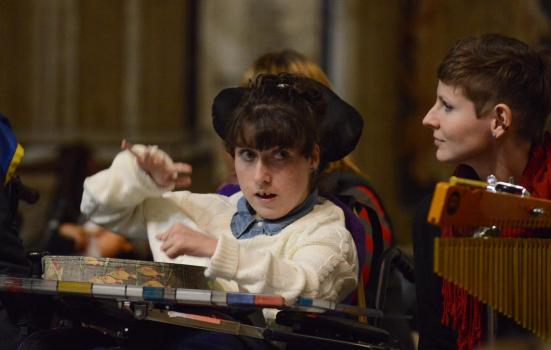Music should be led by young people’s interests and less focused on prescriptive outcomes, according to the findings of a schools action research programme.

Youth Music
Music education must be overhauled and replaced with a system that is less ‘school like’ and which gives teachers, music leaders and young people more autonomy, a new report has advised.
Doing so would help ensure young people at risk of low attainment, educational exclusion or general disengagement achieve the best musical and educational outcomes.
“The fewer opportunities for young people to be independent and have their voices heard, the more disengaged they become with learning effectively at school,” said Youth Music CEO Matt Griffiths.
“Instead of a narrative based on reinforcing differences between formal and non-formal music education, we need to articulate what high-quality music education – putting young people’s expectations, ideas and passion for music right at the centre – looks like now, and could look like in the future.”
Exchanging Notes
Griffiths was commenting on an interim evaluation of Exchanging Notes, Youth Music’s four-year action research programme that is bringing together schools and music education providers in seven project partnerships.
The programme, which started in September 2014, aims to assess whether studying music-making has a positive impact on young people’s attainment, engagement and wellbeing during their school life.
Case studies in the report conclude cultural experiences offered through the Exchanging Notes programme have “positively affected” young people’s educational progression, their social and emotional wellbeing and perceived value of school.
Key disconnect
The key challenge identified by researchers at Birmingham City University, who were appointed to evaluate the programme, was a disconnect between approaches: music leaders were found to focus on the value of playing music, and schools on learning outcomes.
There was a similar tension between the schools’ need to follow the curriculum – with teachers often held accountable for the session outputs – and the desire among music providers to let young people lead the sessions.
Carol Reid, Programme Director at the National Foundation for Youth Music, admitted funding cuts and the pressure of schools’ performance measures that are squeezing the arts out of schools are a challenge. But she encourages new thinking about how music, if delivered in a different way, could help schools achieve objectives that are not necessarily related to the EBacc.
She emphasised a new model of delivery would need to be decided collaboratively by schools, music leaders, teachers and Government.
Writing in the report foreword, Griffiths took this further: “Exchanging Notes is taking place within an education policy environment at odds with the best practice highlighted in this report.
“Just imagine how much greater the outcomes might be if they were talking place within an environment where young people are at the centre, where individual learning is encouraged and where the workforce are given the space to be creative and reflect on their own educational practice.”
The project will come to an end in July 2018 and a concluding piece of research, due to be released at the end of 2018, will look at changes in numeracy, literacy and attendance for young people involved in the programme.




